Carbocisteine - syrupused for the treatment of children and adults with various lesions of the respiratory system and some other pathologies. The medication is considered effective and helps prevent the progression of diseases, as well as the development of complications. Despite this, the use of the medication must be agreed with a specialist.
Record content:
- 1 Forms of release and composition of the drug
- 2 Pharmacological properties
- 3 Pharmacodynamics and pharmacokinetics
- 4 Indications for use
- 5 Contraindications
- 6 At what age can the drug be used?
- 7 Instructions for use, dosage
- 8 Side effects
- 9 Overdose
- 10 special instructions
- 11 Drug interactions
- 12 Analogs
- 13 Terms, conditions of sale and storage
- 14 Price
- 15 Video about mucolytics for children
Forms of release and composition of the drug
The medication can be purchased in the form of a syrup for oral administration. It is most commonly used to treat children. The syrup is packaged in 120 ml dark glass bottles. Sometimes you can find bottles of 300 ml. The syrup has a specific aroma and sweet taste, as well as a viscous consistency.
Each syrup bottle is placed in an individual cardboard box. In it you can find detailed instructions that describe the rules for using the medicine.
As the main active component in the composition of the drug, carbocisteine is present, which has the main therapeutic effect. In syrup, its concentration can be 2 or 5%. This means that 1 ml of the product accounts for 25 or 50 mg of the active ingredient.
Present in the composition and excipients:
- Aromatic caramel elixir.
- Sodium hydroxide.
- Cinnamon oil.
- Sucrose.
- Purified water.
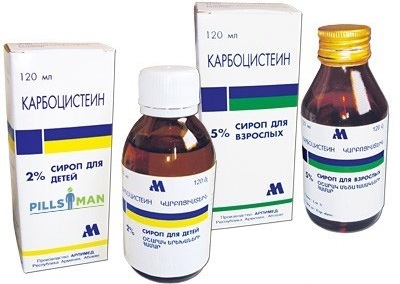
Carbocisteine syrup for children
Excipients do not have medicinal properties, but they give the drug a smell and taste, which makes it easier to take.
It should be noted that the drug is also available in the form of capsules for oral administration. 1 capsule contains 375 mg of carbocysteine. They are packaged in blisters of 8 pieces. An individual cardboard box contains instructions and 4 capsule plates. The drug in any form is produced by a Ukrainian pharmaceutical company.
Pharmacological properties
Carbocisteine is a syrup for children with pronounced mucolytic and expectorant properties. The active substance of the drug penetrates into the tissues of the bronchi and lungs, has a therapeutic effect by activating production of phlegm, as well as stimulating the cough reflex, in which it is excreted from the lower respiratory ways.
As a result, the course of the underlying disease improves, the reproduction of microorganisms, which are present in sputum in different quantities, stops. Thanks to the anti-inflammatory properties, there is a significant improvement in the condition, the elimination of general symptoms, which are almost always present in various pathologies of the respiratory system.
By stimulating the cough reflex, blood circulation in the affected area is improved. Blood cells carry a large amount of oxygen and nutrients to the tissues, which improves metabolic processes and promotes the regeneration of areas affected by bacteria.
The complex effect of the remedy helps to quickly cope with acute or chronic pathologies to facilitate the course obstructive diseases, and the absence of aggressive components in the composition makes the drug the most preferable for children.
Pharmacodynamics and pharmacokinetics
After taking the drug inside, its active component enters the systemic circulation and concentrates in the affected area. Carbocisteine acts on the tissues of the bronchi and lungs, stimulates the secretion of mucus and its liquefaction. As a result, the bronchi or lungs are filled with phlegm, which causes the patient to cough more often in order to remove phlegm.
The active ingredient also activates the cough reflex, even in the absence of a large amount of sputum. As a result, there is a gradual cleansing of the airways with simultaneous restoration of organ tissues.
If there are microbes in the sputum, they are excreted along with the mucus when coughing, which is considered advantage, since many drugs are aimed only at thinning phlegm, but do not stimulate cough reflex.
As a result, microbes multiply and symptoms worsen. When using syrup, this is not observed, therefore it is quite often prescribed for stagnant processes in the lungs and bronchi.
It should be noted that the active ingredient not only improves the condition of the tissues, but also stimulates the local immunity, which increases resistance to various microbes when they re-enter the respiratory paths.
After the syrup enters the digestive tract, the active component is absorbed through the wall of the small intestine and spreads through the systemic circulation. Most of the carbocysteine is concentrated in the organs of the respiratory system, and a small part circulates through the bloodstream.
The maximum concentration in the blood is reached 2 hours after oral administration. The processing of the active substance takes place in the liver and digestive tract.
The bioavailability of the product is rather low, but this does not diminish its effectiveness. The active substance does not accumulate in the tissues and blood of patients, which explains the short period elimination, which is only 4-6 hours, depending on the characteristics of the patient's body and the dosage.
The drug in a small amount penetrates into breast milk, the active ingredient is able to overcome the placental barrier. The main part of the ingredient after processing is excreted by the kidneys, a small amount is evacuated by the intestines.
In patients suffering from diseases of the digestive tract or urinary system, there is a slowdown in the absorption and excretion of components from the body. If the disease is at an initial stage, the effectiveness of the medication is almost not reduced.
Indications for use
Carbocisteine is used to treat children of all ages.
Most often, syrup is prescribed when diagnosing the following pathologies:
- Bronchitis in acute and chronic form with the detection of a large amount of viscous sputum in the bronchi and difficulty in its excretion. In this case, the medication can be used in the obstructive form of the disease, when, under the influence of microbes and other factors, changes in the tissues of the organ are observed.
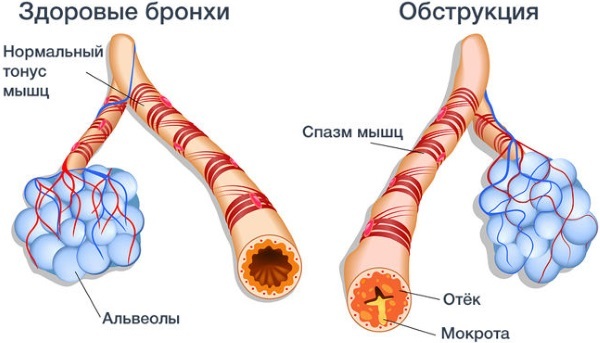
- Acute or chronic pneumonia. At the same time, patients should have sputum in the lungs, which is slowly excreted due to its viscosity and as a result of the inability to stimulate its evacuation by coughing.
- Cystic fibrosis at different stages of development.
- Bronchial asthma of various courses. In most cases, the medicine is used for frequent attacks, as well as with the regular development of bronchitis against the background of bronchial asthma.
- Preparing patients for bronchoscopy and bronchography. For this purpose, the remedy is used more often for adults.
- Bronchiectasis at various stages.
- Rhinitis and sinusitis, accompanied by the throwing of phlegm into the bronchi and cough. In this case, the tool can only be used as part of a comprehensive treatment.
- Sinusitis in the initial and progressive stages.
Sometimes the remedy is used during the recovery period after surgical interventions on the organs of the respiratory system, in which intrachial anesthesia was used.
Contraindications
The medicine is not prescribed if an intolerance to its components or a tendency to similar manifestations in the patient's history is revealed. For children, the drug is not prescribed in case of detection of phenylketonuria, since the use of the drug can provoke complications.
Chronic glomerulonephritis or severe acute pyelonephritis is considered a contraindication for treatment, since it can lead to an increase in the toxicity of the active substance. Contraindications include the acute period in case of duodenal ulcer and stomach ulcer, acute heart failure.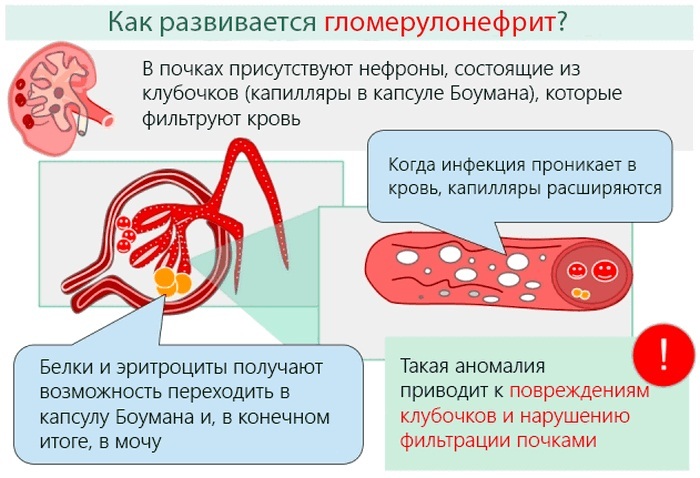
During the recovery period after suffering a stroke or myocardial infarction, the drug is not prescribed. It is contraindicated during lactation and during pregnancy, since there is not enough data on the effect of the ingredients of the composition on the development of the fetus and the mother's body.
You should not use the syrup if you are allergic to the auxiliary components of the composition, since some flavors and other additives can lead to an aggravation of the underlying disease. The medication is used with caution during the recovery period after injuries, as well as when forced to be in a supine position as a result of damage to the bones of the limbs or the spine.
At what age can the drug be used?
Carbocisteine is a syrup for children, prescribed to patients over 1 month old. At an earlier age, the drug is not used, since it can provoke complications. In each case, the pediatrician makes a decision individually, depending on the patient's condition, age and the presence of the risk of complications.
Instructions for use, dosage
The drug should only be used as directed by a physician and in the correct dosage. The syrup is taken only orally, and its dosage is determined depending on age.
| Patient age | Syrup dosage and duration of use |
| Children from 1 month to 2.5 years | For such patients, the drug is prescribed in courses of 5-10 days, depending on the severity of the disease and the presence of a risk of complications. The daily dosage for the patient is 100 mg, that is, 4 ml of syrup in the case of using 2% of the drug and 2 ml in the case of using 5% of the drug. You should not take the syrup at a time, it is better to divide the norm into 2 doses in the morning and in the evening. The drug can be taken before meals. But it is better to take the syrup after eating, which will reduce the risk of developing complications from the digestive tract. |
| Patients from 2.5 to 5 years old | Patients from 2.5 years old are prescribed 200 mg of the drug per day. The daily rate is divided by 2 times, taken in the morning and evening. The duration of the therapeutic course is 10 days. If necessary, the course is extended according to individual indications and only as prescribed by a doctor. |
| Children from 5 to 18 years old | For children from 5 years of age, a single dosage of the medication is 200 mg, the syrup should be taken 3 times a day. The duration of the treatment course is 7-14 days, depending on the severity of the pathological condition. It is forbidden to independently increase the dosage or prolong the therapeutic course. |
It is important to remember that when using a syrup, you must pay attention to the concentration of the active ingredient per ml., since the amount of liquid is determined precisely from the calculation of the dosage of the active component. This means that the daily rate of 100 mg does not correspond to 100 ml of syrup, but is equal to 4 or 2 ml, depending on the concentration of the active substance.
The maximum duration of the treatment course for various conditions is 30 days. In the absence of the effect of therapy, another remedy is used.
Side effects
Violation of the instructions will certainly lead to the development of negative reactions from the internal organs. However, compliance with all recommendations cannot completely eliminate the risk of such violations.
The most common complications:
- From the nervous system possible physical activity, sleep disturbance and excessive emotional arousal. Children from 5 years old can talk about headaches and dizziness, and younger patients cannot always talk about discomfort. In addition, sleep disorders can trigger depression and other emotional disorders associated with excessive fatigue. In some cases, complications manifest themselves in the form of weakness and fatigue.
-
From the digestive tract complications occur most often and are manifested in the form of pain in the stomach and intestines. Digestive disorders. Patients note increased gas production, the development of intestinal colic. Appetite in children worsens, thirst and dryness of the mucous membranes of the oral cavity are noted.
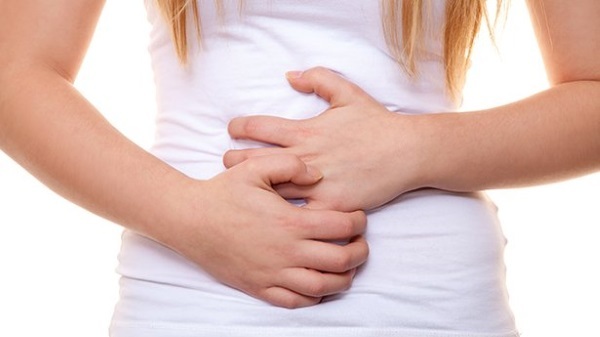
- From the urinary system complications are rare. In most cases, they manifest themselves in the form of increased urination and aggravation of the symptoms of chronic kidney pathologies.
- Allergic reactions in most cases, the skin is affected, but sometimes the mucous membranes of the eyes and nose are involved in the process, conjunctivitis or rhinitis develops, which significantly worsens the condition. In addition, a rash appears on the skin of the trunk and limbs, itching, peeling and irritation are observed.
It is worth noting that with the aggravation of the condition, the allergic reaction manifests itself more pronounced, which leads to the appearance of general symptoms. The first adverse reactions during the period of treatment should be the reason for refusing to use the syrup and referring to a specialist.
Overdose
Carbocisteine is a syrup for children, which can provoke an overdose, provided that high doses of the drug are taken for a long time without a doctor's prescription. In case of an overdose, the patient's condition is aggravated, there is the appearance of large spots on the skin, as well as increased itching.
In addition, there is swelling of the mucous membranes of the eyes and skin of the eyelids, sour eyes. In many children, the most pronounced signs of an overdose are observed from the digestive tract. There is severe nausea and frequent bouts of vomiting, which do not depend on food intake and do not alleviate the patient's condition.
In addition, pain in the stomach area increases, frequent loose stools or persistent constipation are observed. With a prolonged course of the disorder, symptoms of dehydration appear, associated with a constant loss of fluid and a violation of its assimilation in the body. Signs of an overdose are considered a reason for an immediate refusal to use the drug.

If for several hours the patient's condition does not improve or worsens, it is worth visiting a doctor who prescribes symptomatic therapy. Usually, treatment involves gastric lavage followed by the appointment of enterosorbents and agents to improve the condition of the mucous membranes of the stomach.
special instructions
The medication should not be used without a doctor's prescription and preliminary examination. Otherwise, the risk of developing severe complications increases significantly. When using syrup, it is important to measure the dosage exactly as directed to avoid the development of an overdose.
When treating, it is important not to combine syrup with food intake. It is better to use it 20-40 minutes after a meal, which will speed up absorption. in the digestive tract. During the treatment of a newborn child, you should carefully monitor his condition. If even minor complications appear, it is important to visit your pediatrician immediately.
If the drug is prescribed to an adult, it is allowed to choose a liquid dosage form. However, it is more convenient to take capsules. Adults are prescribed 2 capsules 3 times a day for 1-3 weeks, depending on the disease and the degree of its neglect.
Drug interactions
Carbocisteine is a syrup for children that cannot be combined with other mucolytics, even if they have a different composition. This is associated with an increased risk of developing bronchospasm and other complications against the background of excessive activation of the cough reflex.
It is not recommended to use syrup at the same time with m-anticholinergics, as well as other antitussives. This not only weakens its effectiveness, but can also become a causal side effect.
The appearance of negative reactions is not noted in the case of a combination of a medication with drugs based on aminophylline. This enhances its effectiveness, but the appointment should only be made by a doctor if indicated. High efficiency of treatment is achieved when the syrup is combined with antibiotics and some anti-inflammatory drugs.
If the child takes any medication on an ongoing basis, the pediatrician should be warned about this. He will be able to choose the optimal combination of medicines.
Analogs
If it is impossible to use the medication, a substitute is prescribed.
Many analogs have similar therapeutic properties:
-
Mucolic - syrup, which also contains carbocisteine as the main active ingredient. It has pronounced properties and is used in the treatment of children from 1 month of age. The drug is prescribed in an individual dosage for cough, bronchitis, pneumonia and other conditions, accompanied by the accumulation of mucus in the bronchi and lungs.
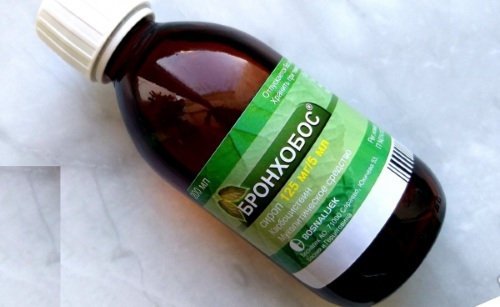
Bronchobos syrup for children - Bronchobos - a remedy in the form of capsules and syrup, which is prescribed for adults and children over 1 month of age for coughing, inflammation of the tissues of the lungs, bronchi. The drug is highly effective, helps to cope with severe manifestations of diseases and prevents the development of complications. It is prescribed by the doctor based on the symptoms of the disease.
- Libeksin Muko - a syrup that contains carbocisteine as an active ingredient and is prescribed for adults, children from 2 years of age in order to stimulate sputum discharge. The drug is highly effective, well absorbed in the body and rarely provokes negative reactions.
The appointment of any analogue should be done by a doctor. Despite the similar composition and properties, some substitutes can adversely affect the patient's condition.
Terms, conditions of sale and storage
To date, the dispensing of funds from the pharmacy is carried out without a prescription from a doctor. You can store the syrup for 3 years.
During storage, it is important to limit access to children, moisture and direct sunlight. The date of manufacture of the drug is indicated on the package; it is strictly prohibited to use it after the expiration date.
Price
The cost of the medication may depend on the region of distribution and the specific pharmacy. The average price is 200-390 rubles. depending on the amount of syrup in the bottle.
Carbocisteine is a popular, relatively safe and effective syrup used for adults and children. The drug has pronounced properties, in combination with many medicines, it brings a good result, but the appointment should only be made by a doctor after examination and diagnosis.
Video about mucolytics for children
Komarovsky on mucolytics and expectorants:



